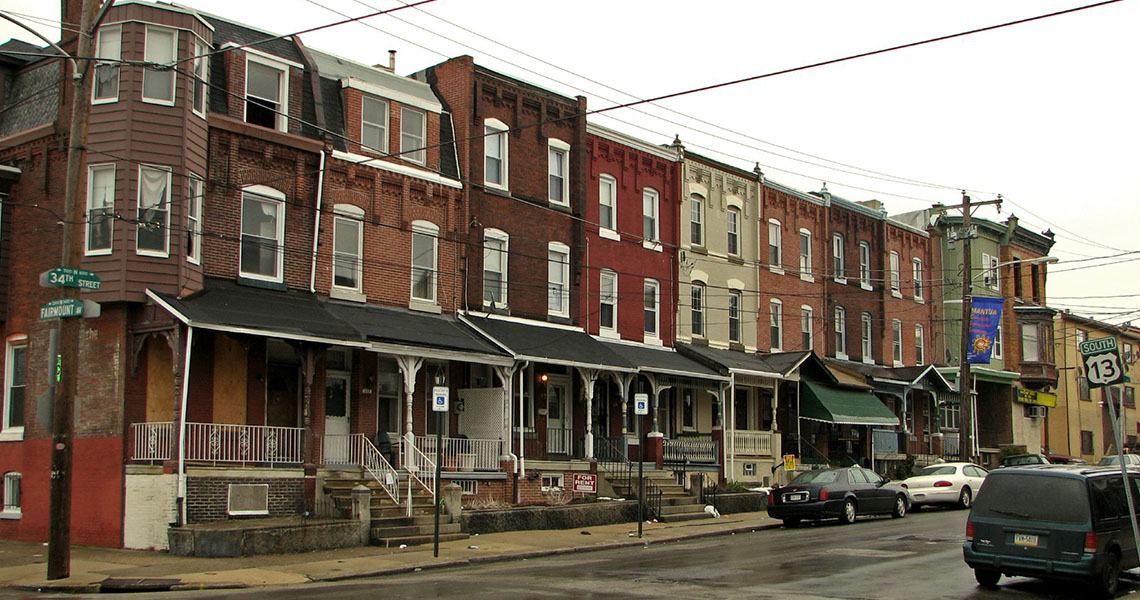Home Preservation Initiative
Assessing the relationship between neighborhood housing repairs and health

(Ian Freimuth/Flickr.com via Creative Commons)
Summary
In the Philadelphia neighborhood of Mantua, home preservation and repairs was one of the critical needs identified by residents during a comprehensive neighborhood planning process. The UHC is working with the Home Preservation Initiative (HPI) to help understand the experience of residents and how their health and neighborhood conditions might be impacted by the program.
The HPI is a collaborative service delivery model created to provide high quality home repairs in a collective, cost-effective manner within a targeted area of West Philadelphia. The initiative is made of a number of nonprofit partners, including Philadelphia Local Initiatives Support Corporation (LISC), Habitat for Humanity Philadelphia, Rebuilding Together Philadelphia, People’s Emergency Center Community Development Corporation, Mt. Vernon Manor Community Development Corporation, and Drexel University’s Dornsife School of Public Health.
The UHC is supporting HPI’s efforts by examining the experience of residents and how their health might be impacted by home repairs. The UHC team designed a qualitative study to interview residents and gather information to inform the program and develop further opportunities to evaluate the impact of the program on health outcomes. Additionally, we are currently assisting with a quantitative evaluation of change in household and neighborhood characteristics over time for houses that received HPI services. This work in planned for AY 2019-2020.
Partners
Philadelphia LISC, Habitat for Humanity Philadelphia, People’s Emergency Center (PEC) Community Development Corporation, Rebuilding Together Philadelphia, and Mt. Vernon Manor Community Development Corporation.
Research Methods
The UHC team designed an in-depth qualitative study in collaboration with the HPI group to interview 60 residents in the Mantua neighborhood of West Philadelphia. The Dornsife School of Public Health research team partnered students with community connectors trained to conduct outreach in the neighborhood from People's Emergency Center (PEC) Community Development Corporation. The team conducted two research training sessions in advance of recruitment and conducting the interviews.
Teams of students and community connectors conducted in-depth interviews in June and July 2016. Interviews included questions to assess the residents' perception of home and neighborhood, perception of health due to their housing and neighborhood, and changes in quality of life resulting from the repair services.
Existing research suggests a number of health domains that are associated with residence in sub-standard housing including mental health impacts such as depression, and weaker social relations. Physical health impacts include reduced mobility, respiratory problems, and injuries.
Our interviews confirmed that home repairs were associated with fewer home-related accidents and illness (such as falls, allergies and asthma). The most common health benefit reported by participants was improvement in mental health following receipt of HPI repair. Some residents noted how neighborhood factors can impact individual health. Among those residents, almost all of them spoke about the negative effects of neighborhood issues on mental health. Poor housing conditions, dilapidated buildings, and abandoned lots in the neighborhood caused residents to “feel depressed.” Violence, trash, drugs, and noise in the neighborhood also negatively affected their mental health. The majority of residents identified change and the need for change as important in their neighborhood. Residents said the HPI project has improved the physical quality of houses and thus improved their neighborhood overall. However, many noted that additional work is necessary to continue improving the condition of the Mantua neighborhood.
Next Steps: We are currently assisting HPI to use administrative and geographic “big data” to evaluate change at the household and neighborhood level for properties that received HPI services over the past 5 years. This project will be developed and executed during AY 2019-2020.
Acknowledgements
Research Team
Student Research Assistants
- Luwam Gebrekristos
- Alana Cordeiro
- Alton Reid
- Kia Williams
- Nilanjana Samanta
- Manasvi Shah
- Robyn Yano
- Daniel Gedeon
- Christine Chen
- Dnyanada Kadev
Partners
This project was supported by the Drexel Urban Health Collaborative. Philadelphia LISC contributed funds for participant incentives.